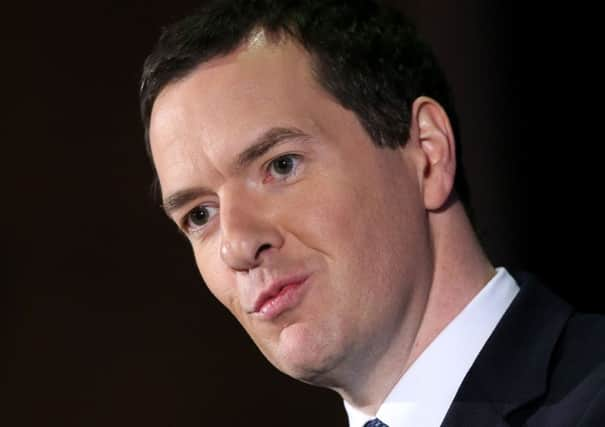Budget: George Osborne to scrap yearly tax returns


The measure in the Chancellor’s last Budget before May’s general election will herald the end to the yearly forms currently filled in by 12 million people.
Mr Osborne is thought to have a £6 billion windfall to spend on reducing the impact of austerity, thanks to low inflation. Other measures expected to be announced today include giving pensioners access to annuities early and introducing incentives to help the North Sea oil and gas industry.
Advertisement
Hide AdAdvertisement
Hide AdThe end of the annual tax return will see new “one-stop-shop” digital accounts – accessible at any time from a smartphone, computer or iPad – replace the self-assessment forms. The change is designed to make it easier for individuals and businesses to pay the correct amount at the right time without having to fill in an annual form.
The digital service will bring together taxpayers’ details in one place, allowing them to log on and view all their affairs at any time and update HMRC on their tax affairs and pay their contributions at a time of the year that suits them.
The government hopes the move will improve transparency by allowing people to see how their contributions are calculated.
Users of the new system will be able to pay all the taxes they owe when it suits them and sign up to other government services such as tax reliefs or state pension forecasts.
By early 2016, five million small businesses and ten million individuals will have access to their own digital tax account and by the end of the next parliament in 2020, all 55 million individuals in the UK will have one.
By 2017 the first set of customers with simple tax affairs will no longer have to fill in an annual tax form if they would prefer to use the digital service.
The expected announcement comes with the Office for Budget Responsibility (OBR) thought to be poised to cut its forecast for borrowing over the coming financial year by up to £6bn, giving Mr Osborne leeway for pre-election giveaways.
Expectations are high that he will use at least some of this “wriggle room” to revise projections for government spending upwards in order to kill off Labour’s accusation that he is planning to shrink the state to a size last seen in the 1930s.
Advertisement
Hide AdAdvertisement
Hide AdThe OBR’s finding last December that Mr Osborne’s plans envisaged total public spending plunging as a proportion of GDP to “what would probably be its lowest level in 80 years” has been seized upon by Labour leader Ed Miliband, who has warned that a Conservative victory would mean austerity on a scale not seen since before the creation of the NHS.
A tweak in the Budget would allow the Chancellor to announce that, while still falling over the next few years, state spending in 2019-20 will not reach the 35.2 per cent forecast in December but a figure around 36 per cent to 37 per cent, which is similar to that seen in the early years of the last Labour administration.
Meanwhile, Mr Osborne could spike more Labour guns by announcing a raid on high-earners’ pension pots, reducing the lifetime allowance from £1.25 million to £1m.
This would raise £1.5bn from the wealthiest in society to pay for popular moves such as a possible increase in the personal income tax allowance to £11,000. It would have the additional advantage for the Tories and Liberal Democrats of robbing Mr Miliband of the funds he has earmarked to pay for Labour’s promised reduction in university tuition fees.
Liberal Democrat Deputy Prime Minister Nick Clegg revealed at the weekend that he had been pressing the Chancellor for a further increase in the personal allowance, beneath which no income tax is payable.
The allowance has already risen from £6,475 in 2010 to reach £10,600 next month, with both Tories and Lib Dems pledging further hikes to £12,500 during the next parliament.
Older voters have already been promised a boost in the Budget, with five million pensioners with existing annuities due to be granted the right to sell them on from April next year.
And business groups have been lobbying the Chancellor for moves such as a freeze or cut in air passenger duty, reductions in charges on North Sea energy firms and moves to use the tax system to encourage research and development.
Advertisement
Hide AdAdvertisement
Hide AdSNP finance secretary John Swinney said: “I hope that the Chancellor will have listened to reasoned proposals ahead of delivering his Budget and that economic growth and tackling inequality will be given equal representation.”
Labour’s shadow chancellor Ed Balls said: “This Budget cannot hide the fact that after five years of the Tories, working families are worse off and our NHS is going backwards.”
CBI director-general John Cridland said: “First and foremost what we need is a responsible Budget – let’s make sure we don’t put politics ahead of economic growth and investment.”
FOLLOW US
SCOTSMAN TABLET AND MOBILE APPS